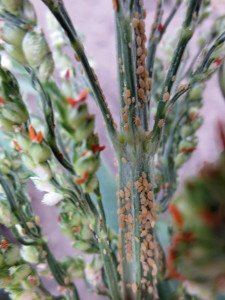With the clock ticking down, crop policy experts are reaching out to rural farmers in the Lower Rio Grande Valley to inform them about long-term decisions they’ll have to make soon under the 2014 farm bill.

Sugarcane aphids on South Texas grain sorghum (shown here on stalks) will be among the topics to be discussed at the Hidalgo/Starr County 2014 Farm Bill Workshop Training in McCook on Jan. 28.
The Hidalgo/Starr County 2014 Farm Bill Workshop Training will be held from 9 a.m. to 1 p.m. Jan. 28 at the Immaculate Conception Catholic Church Parish Hall, 28212 Farm-to-Market Road 2058 in McCook, just south of Farm-to-Market Road490.
One Texas Department of Agriculture continuing education unit for private pesticide applicators will be available.
“McCook is in rural western Hidalgo County, so we’re hoping to attract producers from both Hidalgo County and neighboring Starr County, although the meeting is open to all and there is no registration fee,” said Vidal Saenz, a Prairie View A&M University Cooperative Extension Program agent and farm advisor for Hidalgo County.
The education workshop training is sponsored by the Cooperative Extension Program and the Texas A&M AgriLife Extension Service, partnering with the U.S. Department of Agriculture’s Farm Service Agency in Hidalgo and Starr counties.
“In February and March, producers are going to have to make five-year decisions,” Saenz said. “They’ll have to choose between two safety net programs. One is called Price Loss Coverage, or PLC, and the other is the Agriculture Risk Coverage, or ARC. They’ll also have the opportunity to reallocate base acres and update payment yields.”
Farmers will have to make these decisions based on their operations, decisions which will extend through the life of the farm bill, he said.
The deadline for base allocation and yield update is Feb. 27; the PLC/ARC decision deadline is March 31.
Ronnie Zamora, a Cooperative Extension Program agent in Willacy County, said experts want to be sure that underserved growers have the opportunity to get the information they need to make informed decisions.
“Growers out here in the rural areas who may not have attended prior farm bill workshops elsewhere may not be sure which program is best for them,” he said. “We want to make sure rural growers understand their options and how important this is, because the decisions they make now will affect them for years to come.”
Saenz and Zamora said Prairie View staff met with Judith Canales, state director of the Farm Service Agency, who emphasized the need to reach all growers, including those in more rural and underserved areas.
“We’ve got excellent speakers on the agenda who are specially trained in the 2014 farm bill and who will go to great lengths to make sure growers are fully informed so that they are confident and comfortable with the decisions they’ll be making, ” Saenz said.
In addition to the farm bill, other topics to be discussed include updates on Farm Service Agency loan programs, a crop analyzer to help growers maximize profits, loan program updates and an insect pest update specific to the grain sorghum and sunflower crops grown in the area.
“Tacho Cavazos, executive director of the Willacy County Farm Service Agency in Raymondville, will discuss major provisions of the farm bill,” Saenz said. “Mac Young, an AgriLife Extension program specialist in Robstown, will teach growers how to use the new Lower Rio Grande Valley crop analyzer to help determine which crop is most profitable. Arnuflo Lerma, the Farm Service Agency farm loan manager in Edinburg, will discuss favorable changes to the farm loan programs. And Daniella Sekula-Ortiz, an AgriLife Extension integrated pest management agent in Weslaco, will discuss the latest information on the sugarcane aphid on grain sorghum, and the head moth on sunflower crops and how to treat for both.”
The event will close with a question-and-answer session and lunch. For more information, contact the AgriLife Extension office in Hidalgo County at 956-383-1026or in Willacy County at 956-487-2306.
Source:agrilife.org